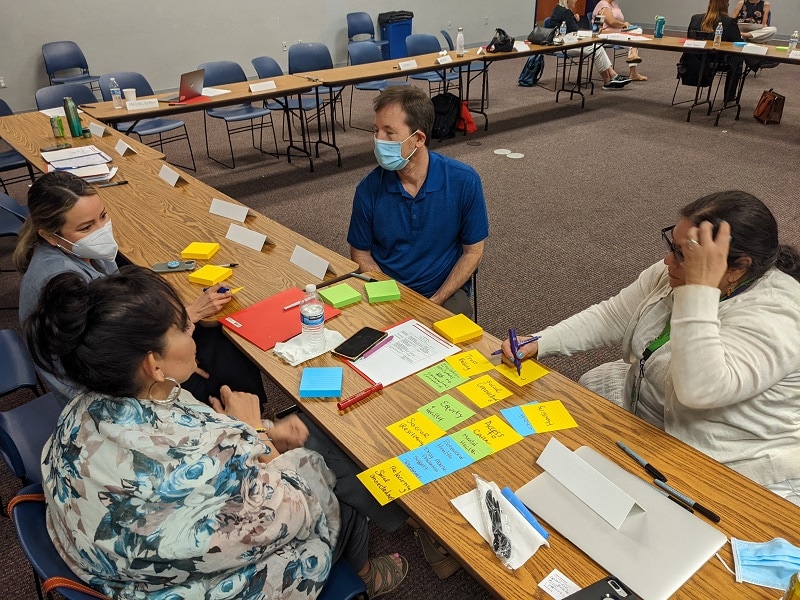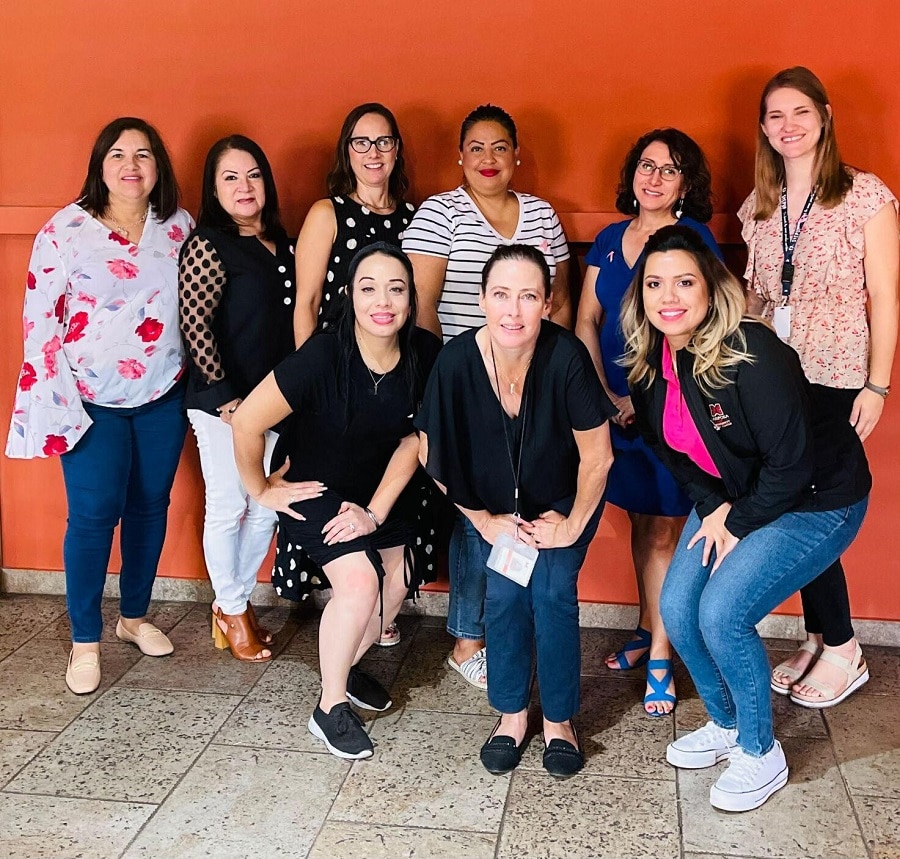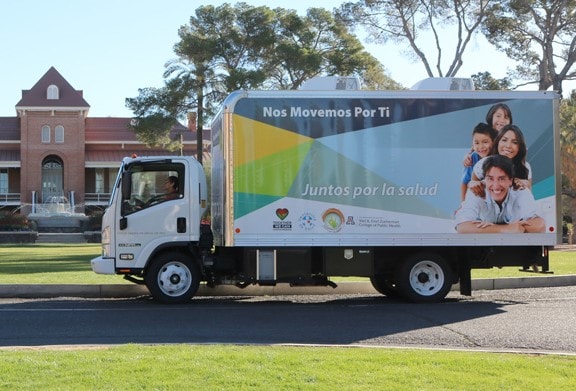University of Arizona Prevention Research Center
Population of Focus: Latinx population in Southern Arizona
Topic Areas: chronic disease, people who experience health disparities in Southern Arizona
Introduction, Mission, and Vision

Dr. Scott Carvajal with three AZPRC community partners at a community action board meeting breakout session.
The University of Arizona Prevention Research Center (AzPRC) is one of 26 Prevention Research Centers (PRCs) supported by the Centers for Disease Control and Prevention (CDC) for the 2019–2024 funding cycle. Each PRC is funded to establish and maintain their center and to conduct a core research project. PRCs may receive supplemental funding to conduct additional research projects and activities.
Championing community health worker effectiveness in Arizona and beyond is both the tagline and mission of AzPRC and its partners. AzPRC works collaboratively to develop, test, and research effective community health worker (CHW) programs. It also works at the state and national level to promote sustainability and recognition for this valuable workforce.
AzPRC has conducted academic-community collaborative research designed to reduce chronic disease health disparities in Latinx communities along the United States-Mexico border in Arizona for more than 20 years. It plans its activities with a Community Action Board (CAB) made up of about 20 organizations and programs that share a common interest in improving quality of life along the border.
CAB members guide AzPRC activities and have expressed their support and commitment to expanding its foundation of:
- Developing and carrying out evidence-based strategies that use CHWs to address disparities in health promotion and disease prevention.
- Promoting health through environmental and system change strategies along the border.
“A key component of our center’s research and programs involves working with community health workers, who are considered trusted members of the border and tribal communities they serve,” said Scott Carvajal, PhD, co-principal investigator of AzPRC. “Our partnerships ensure we are asking good research questions and leveraging community resources to address health needs and that the interventions we develop are realistic and sustainable beyond the length of the funding period.”
Core Research
Each PRC uses a community-engaged approach to conduct one primary applied public health prevention research project called a core research project. Project activities include design, development, implementation, evaluation, and dissemination. PRCs use at least 50% of their CDC funding to conduct the project in partnership with communities.
Unidos: Linking Individuals to Social Determinant and Community Health Services

AzCPCRN & Mariposa Community Health Center staff and team leading an event that highlights “LA VIDA PLENA,” a CPCRN initiative. This was a celebration event held in Nogales Sonora, Mexico.
AzPRC’s core research project for the 2019–2024 funding cycle seeks to develop a model community-clinical intervention to reduce chronic disease risk and promote social and cultural resilience among the Latinx population in Arizona. The goal is also to create an intervention that can be used in other regions and populations.
As part of this project, CHWs based at the county and community level will:
- Support and connect participants to health promotion resources.
- Provide individual- and group-based support guided by a new way of understanding how social and cultural resilience can create health advantages in the Latinx community.
- Leverage community resources to help individuals address needs related to social determinants of health.
The Unidos project uses two primary concepts from the Sociocultural Resilience Model: cultural processes and social networks. Small groups discussed what each concept means and how it relates to health, identified questions to ask for measurement of cultural processes and social networks, and proposed activities that participants could engage in to build the concept of the sociocultural resilience model.
Additional Research
PRCs may receive supplemental funding to work on additional research projects each funding cycle. These Special Interest Projects (SIPs) focus on a variety of health topics or gaps in scientific evidence. PRCs can also conduct additional research as part of SIP Thematic Research Networks, which are groups of PRCs working together on related health topics.
PRC Vaccine Confidence Network (PRC VCN)

AzPRC’s strategy includes deploying a mobile unit and team in border counties to provide vaccines, vaccine registration, and educational resources and to offer other health-related services.
In April 2021, CDC funded a 12-month award to all 26 PRCs to form the PRC VCN in support of the agency’s Vaccinate with Confidence strategy for COVID-19. As part of this network, AzPRC is examining vaccine hesitancy to find ways to promote vaccine confidence, increase vaccine uptake, and reduce disparities in Latinx, rural, underinsured, and farmworker populations. The goal is to reduce the incidence of COVID-19 in the United States.
AzPRC’s strategy includes deploying a mobile unit and team in border counties to provide vaccines, vaccine registration, and educational resources and to offer other health-related services.
AzVCN partnered with the University of Arizona’s initiative to deliver the COVID-19 Vaccine through the VCN effort. This photograph was taken in front of the University of Arizona’s Old Main building
Managing Epilepsy Well 2.0 (MEW) Network Collaborating Center
The MEW Network works to improve the health and well-being of people living with epilepsy by developing self-management programs they can use. AzPRC collaborates with other PRCS to develop, evaluate, implement, and share self-management programs and tools.
AzPRC is also helping to evaluate the effectiveness of the network’s MINDSET (Self-Management Epilepsy Decision Support for Adult People with Epilepsy and Their Providers) program. For example, AzPRC is working with the University of Texas PRC to develop and evaluate an integrated, scalable CHW training and implementation program for the Epilepsy Foundation. This new program is called A New Mindset: Enabling Efficacious, Scalable, and Sustainable CHW-mediated Self-Management Support for People with Epilepsy.
AzPRC’s work in this area supports objectives from the Institute of Medicine and the US Department of Health and Human Services to increase appropriate medical care for people with epilepsy, reduce barriers to local health and wellness programs, and increase social and emotional support.
Cancer Prevention and Control Research Network (CPCRN) Collaborating Center
This network seeks to advance collaboration that supports cancer survivorship science and outreach with the goal of promoting health equity among cancer survivors. AzPRC co-chairs the network’s Cancer Survivorship Workgroup and Cancer & COVID-19 Interest Group.
Contact Information

Location: Tucson, Arizona
Principal Investigator: Scott Carvajal, PhD
Email: carvajal@arizona.edu
Deputy Director: Maia Ingram, MPH